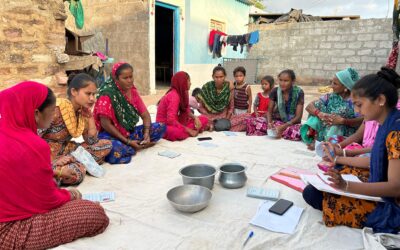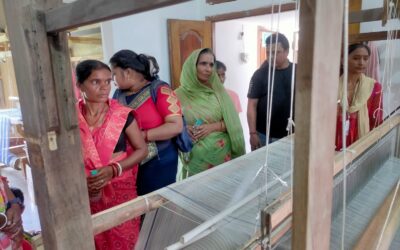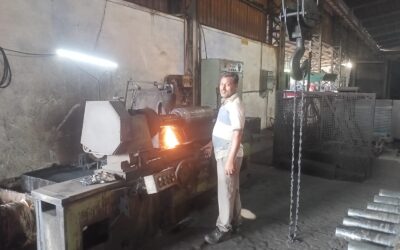As someone who chose to immerse herself into a fellowship program, straight after attending an all-women’s college, the transition to truly accepting the fact that “Change is slow” is still underway. While attending meetings, trainings and interacting with Local Government representatives here in Kutch, Gujarat, I began to wonder where the women were. Although the idea of a ‘Sarpanch Pati’, (more commonly referred to as ‘SP’) is not new to me, I have not really understood the workings of the ecosystem I am a part of, in its ideas, social structures and hierarchies. Most importantly, I don’t think I will get it in a period of one year.
The question of where the women were, is also not completely justified, for there are many exemplary women taking the lead in both urban and rural settings here. My issue then, is with the fact that they are called ‘Mahila Sarpanch’, for why should we attach gender to her occupation? Do we call men a ‘Purush Sarpanch’? Sounds unreasonable, doesn’t it? Why not just say that the sarpanch of Vadasar Gram Panchayat is exemplary?’ It felt to me like a step back in the long struggle for equality, for women to be acknowledged as capable as men.
I am aware that this comes from an ideal scenario based on my own perspective formed through my privileges, experiences and observations of patriarchy intermixing with governance. A conversation with a friend opened my eyes to the other side of the argument. Maybe acknowledging a woman’s triumphs over the odds stacked against them in the first place is also important. Maybe being known as a Mahila Sarpanch is a way to reclaim their struggle of making a place for themselves in an otherwise male-upper-class dominated space.
What emerges is also what we interpret as most important in our own hierarchy of discriminations. For me, it is gender. For someone who has faced class or caste based or religious discrimination, they may see those as the worst. This is not to say that any are below or above the other. It is simply a matter of one accepting how our perspectives work.
Is there an equal number of male and female ward members? Are enough women being written about? Does the Panchayat I am writing about conduct the mandated Mahila Sabha*? – Some questions I ask in my head, and at times, out loud too. In search of these questions, I have met inspiring women and young girls. From one Sarpanch who ensured that a single migrant reached her home in Kolkata and took care of her as her own during the lockdown, to another who gave up her home as the workshop for masks to be stitched in, there are endless stories of everyday actions that are full of qualities that I look for in leaders.
On the other side, there’s still many inequities to overcome, for there are instances of not a single woman participating in a Social Justice Committee meeting or training. According to the Gujarat Panchayat Act, 1996, “A village panchayat shall constitute a committee called the Social Justice Committee for performing such functions as are essential for securing social justice to the weaker sections of the society including persons belonging to the Scheduled Castes and the Scheduled Tribes, as may be prescribed, and the constitution of such committee shall be such as may be prescribed.”
This also includes a committee of 3-5 members, with a mandatory woman member from an SC/ST community. While the inclusion of women may seem like a necessity, given what is described as social justice, it is seldom carried out, keeping in tandem with social traditions and cultures, each unique across the terrain of Kutch.
The leading question then is, if there are provisions on paper, how they are navigated?
This depends on the medium of awareness spreading, the involvement of locals, and community relationships. I have been able to witness some of the greatest relationships between an organization and the community it works with, and the change that has occurred over the years. It has been engaging with the community respectfully and with an understanding of the fact that the process takes time and determination.
It requires building immense trust to allow teams to talk to female members of the house in the last village of India towards Rann of Kutch, let alone invite them for a Mahila Sabha. It takes years of efforts that leave impact in the smallest of ways, such as the first step of a family towards inclusive meetings that have both young girls and boys, which the elders of the community themselves may not have experienced or understand completely but are willing to send their children and grandchildren for.

Perhaps, it is this change, these first steps that I should be looking forward to. Because things take time. I have realized I cannot expect to see equal representation at every meeting or for every second or third Sarpanch I meet to be a woman. What I can expect is meeting a woman of my age in trainings to contest for municipality elections in Bhuj, or a girl from an adolescents’ meeting to say that she wants to reappear for her 10th board exams and eventually go for civil services.
The change is slow, the change takes time, the change moves at its own pace. It is how I view gender in terms of governance, in terms of its context that should matter.
Heavy words such as ‘intervention’ and ‘capacity building’ may not make much sense at the get-go, but in a few years, they will show their impact. When another fellow or outsider like me will witness more than one woman attending a training, they might wonder why the women aren’t the chairperson of the committee.
That is the idea, then. That every small step already achieved is taken as a given, as a baseline, and worked on to achieve the next milestone, as perspectives, goals and even policies (such as the idea of a Mahila Sabha) realign themselves every now and then, especially when it comes to gender and local governance.
*In 2013, the state of Gujarat mandated to conduct Mahila Sabhas, as a village level meeting of women, ahead of the Gram Sabha. This serves to give them a platform to discuss issues that they perhaps cannot bring up in the Gram Sabha and have them engage in leadership with confidence.




0 Comments